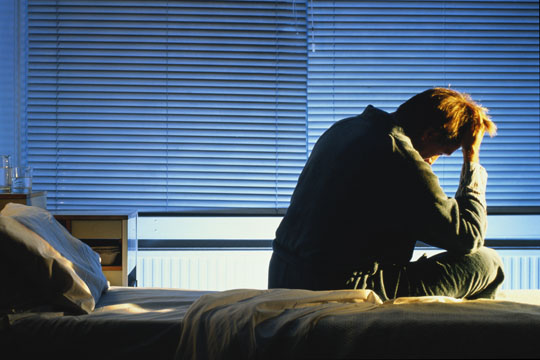
Sleep problems are really tiring
Sleep problems are common among stroke survivors. The problems is either difficulty sleeping or sleeping too much.
Difficulty Sleeping
Many stroke survivors have trouble falling to sleep due to the following sleep problems:- Insomnia describes not being able to fall or stay asleep. Talk to your doctors about treatments like prescription sedatives.
- Sleep-Wake Cycle Disorder: Some stroke survivors have disrupted circadian rhythms and do not get sleepy at night or may it may be hard to wake them in the morning. Exposure to bright light and daylight during wake times can help reset the sleep-wake cycle and improve sleep quality and duration.
Sleeping too much
Too much sleep or sleepiness is call fatigue. Healing the brain and relearning the tasks of daily living takes a great deal of energy. Stroke survivors often feel very tired, especially during their initial recovery. Even simple tasks may be exhausting. Fatigue can produce frustration, sadness, and anger.
Fatigue affects 36 to 77 percent of people who've had strokes, according to research published in a 2013 issue of Neurology. But post-stroke fatigue is not necessarily related to activity level or quality of sleep and does not always improve with rest. Many factors can influence your level of fatigue following a stroke, like depression, medications, spasticity, paralysis, and pain. Mental fatigue is different from physical fatigue, as this article on "neurofatigue" explains.
Physical, mental, and emotional fatigue can play off each other. After a stroke physical fatigue can stem from movement limitations, as well as vision and speech challenges. If you have weakness on one side, you'll need extra energy to do things like getting dressed. If you have speech difficulties and are unable to express yourself or be understood, you may feel mentally and emotionally drained. With mental fatigue, people may not have the energy to focus sufficiently on what they're reading or doing.
Fatigue affects 36 to 77 percent of people who've had strokes, according to research published in a 2013 issue of Neurology. But post-stroke fatigue is not necessarily related to activity level or quality of sleep and does not always improve with rest. Many factors can influence your level of fatigue following a stroke, like depression, medications, spasticity, paralysis, and pain. Mental fatigue is different from physical fatigue, as this article on "neurofatigue" explains.
Physical, mental, and emotional fatigue can play off each other. After a stroke physical fatigue can stem from movement limitations, as well as vision and speech challenges. If you have weakness on one side, you'll need extra energy to do things like getting dressed. If you have speech difficulties and are unable to express yourself or be understood, you may feel mentally and emotionally drained. With mental fatigue, people may not have the energy to focus sufficiently on what they're reading or doing.
The most common sleep disorder is sleep apnea. This is a serious condition. and increases the risk of having a second stroke. Loud snoring, choking, and gasping during sleep may mean that you have sleep apnea.
Continuous positive airway pressure (CPAP) is one of the most common and effective treatments of sleep-related breathing disorders like sleep apnea. CPAP uses a machine to deliver short bursts of compressed air that prevent obstruction in the airway. CPAP can help you get an uninterrupted night of sleep. Alternatively, your dentist can fashion a special mouthpiece (called an oral appliance) that pulls the jaw forward, creating a more open airway during sleep.
Good sleep
Sleeping too much or too little is associated with an increased incidence of stroke. Here are the typical ranges of normal sleep:
- School-aged children: 9 – 11 hours
- Teenagers: 8 – 10 hours
- Adults: 7 – 9 hours
- Older adults: 7 – 8 hours
Below are some essentials of good sleep habits.
- Avoid napping during the day.
- Avoid stimulants such as caffeine (remember, chocolate has caffeine), nicotine, and alcohol close to bedtime. While alcohol is well known to speed the onset of sleep, it also disrupts sleep as the body begins to metabolize the alcohol, causing arousal.
- Morning or afternoon exercise can promote good sleep.
- Establish a regular relaxing bedtime routine.
- Keep the bedroom dark and at a comfortable temperature.
- Prevent and avoid noises that can be heard at night.
- Expose yourself to light during the day.
- Follow a regular sleep schedule. Go to bed and wake up the same time every day.
- Use the bedroom only for sleep or sex. Do not eat food or watch TV in bed.
- Plan to eat dinner meal three hours before you go to bed.
- Limit drinks two hours before bedtime. Drinking fluids at night can lead to frequent trips to the bathroom.
- What Is Sleep Apnea?
- The National Sleep Foundation
- Sleep.org has lots of info about sleep health.
- A sleep quiz to find out more about the myths and realities of sleep
- 3 ways to sleep like a baby
- Sleep education
- Understanding Excessive Sleeping After Stroke
- Sleep After A Stroke: The Key To Faster Recovery